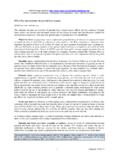Transcription of 20 2011 10 1 P -:HSTCQE=VVZW][ - OECD.org - OECD
1 Please cite this publication as:OECD (2011), OECD guidelines for Multinational Enterprises, OECD Publishing. work is published on the OECD iLibrary, which gathers all OECD books, periodicals and statistical databases. Visit , and do not hesitate to contact us for more :HSTCQE=VVZW][:ISBN 978-92-64-11528-620 2011 10 1 POECD guidelines for Multinational Enterprises2011 EDITION ContentsDeclaration on International Investment and Multinational Enterprises Part I - OECD guidelines for Multinational Enterprises: Recommendations for Responsible Business Conduct in a Global Context Preface I. Concepts and Principles II. General Policies III.
2 Disclosure IV. Human Rights V. Employment and Industrial Relations VI. Environment VII. Combating Bribery, Bribe Solicitation and Extortion VIII. Consumer Interests IX. Science and Technology X. Competition XI. TaxationPart II - Implementation Procedures of the OECD guidelines for Multinational EnterprisesAmendment of the Decision of the Council on the OECD guidelines for Multinational EnterprisesProcedural GuidanceCommentary on the Implementation ProceduresOECD guidelines for Multinational Enterprises 2011 EDITIONOECD guidelines for Multinational Enterprises2011 EDITIONOECD guidelines for Multinational Enterprises2011 EditionThis work is published on the responsibility of the Secretary-General of the opinions expressed and arguments employed herein do not necessarily reflectthe official views of the Organisation or of the governments of
3 Its member 978-92-64-11528-6 (print)ISBN 978-92-64-11541-5 (PDF)Corrigenda to OECD publications may be found on line at: OECD 2011 You can copy, download or print OECD content for your own use, and you can include excerpts from OECD publications, databases and multimedia products in your own documents, presentations, blogs, websites andteaching materials, provided that suitable acknowledgment of OECD as source and copyright owner is requests for public or commercial use and translation rights should be submitted to for permission to photocopy portions of this material for public or commercial use shall be addresseddirectly to the Copyright Clearance Center (CCC)
4 At or the Centre fran ais d exploitation dudroit de copie (CFC) at cite this publication as:OECD (2011), OECD guidelines for Multinational Enterprises, OECD OECD guidelines FOR MULTINATIONAL ENTERPRISES 2011 EDITION OECD 2011 3 Foreword The OECD guidelines for Multinational Enterprises are recommendations addressed by governments to multinational enterprises operating in or from adhering countries. They provide non-binding principles and standards for responsible business conduct in a global context consistent with applicable laws and internationally recognised standards. The guidelines are the only multilaterally agreed and comprehensive code of responsible business conduct that governments have committed to promoting.
5 The guidelines recommendations express the shared values of the governments of countries from which a large share of international direct investment originates and which are home to many of the largest multinational enterprises. The guidelines aim to promote positive contributions by enterprises to economic, environmental and social progress worldwide. The guidelines are supported by a unique implementation mechanism of National Contact Points (NCPs), agencies established by adhering governments to promote and implement the guidelines . The NCPs assist enterprises and their stakeholders to take appropriate measures to further the implementation of the guidelines .
6 They also provide a mediation and conciliation platform for resolving practical issues that may arise. On 4 May 2010, the governments of the 42 OECD and non-OECD countries adhering to the OECD Declaration on International Investment and Multinational Enterprises and related Decision started work on updating the guidelines to reflect changes in the landscape for international investment and multinational enterprises since the last review in 2000. The changes agreed aim to ensure the continued role of the guidelines as a leading international instrument for the promotion of responsible business conduct.
7 The updated guidelines and the related Decision were adopted by the 42 adhering governments on 25 May 2011 at the OECD s 50th Anniversary Ministerial Meeting. Changes to the guidelines include: A new human rights chapter, which is consistent with the Guiding Principles on Business and Human Rights: Implementing the United Nations Protect, Respect and Remedy Framework. FOREWORD 4 OECD guidelines FOR MULTINATIONAL ENTERPRISES 2011 EDITION OECD 2011 A new and comprehensive approach to due diligence and responsible supply chain management representing significant progress relative to earlier approaches.
8 Important changes in many specialised chapters, such as on Employment and Industrial Relations; Combating Bribery, Bribe Solicitation and Extortion, Environment, Consumer Interests, Disclosure and Taxation. Clearer and reinforced procedural guidance to strengthen the role of the NCPs, improve their performance and foster functional equivalence. A pro-active implementation agenda to assist enterprises in meeting their responsibilities as new challenges arise. The Update of the guidelines was conducted by the adhering governments and included intensive consultations with a wide range of stakeholders and partners.
9 All non-adhering G20 countries were invited to participate on an equal footing; they made important contributions, as did participants in the regional consultations in Asia, Africa, Latin America and the Middle East and North Africa. The OECD Business and Industry Advisory Committee, the OECD Trade Union Advisory Committee and OECD Watch represented the views of business, workers' organisations and non-governmental organisations (NGOs) through regular consultation meetings and their active participation in the Advisory Group of the Chair of the Working Party responsible for the Update of the guidelines .
10 The UN Secretary-General s Special Representative on Business and Human Rights, Professor John Ruggie, the International Labour Organisation together with other international organisations, also provided extensive input on the Update. OECD committees on Competition; Consumer Policy; Corporate Governance; Employment, Labour and Social Affairs; Environment Policy; Fiscal Affairs; and the Working Group on Bribery in International Business Transactions contributed to the revisions of the relevant specialised chapters of the work on the Update was supported by the Investment Division as Secretariat of the OECD Investment Committee, in close collaboration with the Legal Directorate; the Centre for Tax Policy and Administration; the Anti-Corruption Division; the Competition Division.










